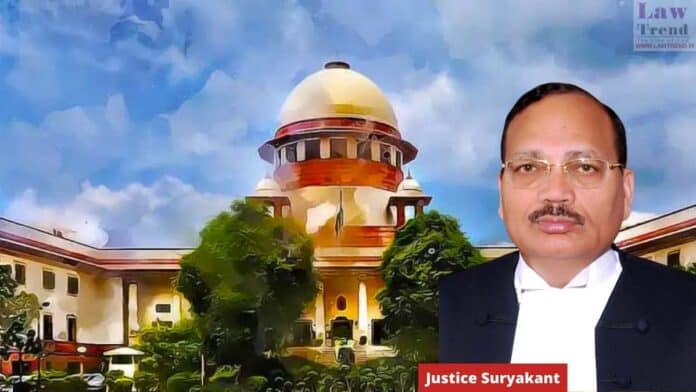Supreme Court judge Justice Surya Kant on Wednesday emphasised the urgent need to bridge the widening gap between the privileged and the vulnerable in accessing justice, stressing that legal aid is not a mere charity but “constitutional oxygen” necessary for the survival of democracy.
Speaking at a lecture titled “Justice for All – Legal Aid and Mediation: The Collaborative Role of Bar and the Bench”, Justice Kant expressed concern that access to justice in India had historically been a privilege of prosperity.
“What troubles me profoundly is a paradox we have unwittingly created — in the world’s largest democracy, access to justice has been till recent a privilege of prosperity. When legal fees eclipse monthly incomes, when procedures demand literacy that millions lack, when courthouse corridors intimidate more than they welcome — we face a stark reality,” Justice Kant remarked.
He observed that while courts are often described as temples of justice, their doors remain “too narrow for the very people they were meant to serve.”
Referring to a recent case where senior advocates urged the top court to hear a matter directly, Justice Kant said he questioned whether the Supreme Court was meant only for “selected litigants and selected lawyers.” He underscored that the institution must remain accessible to all, regardless of professional or social status.
As executive chairperson of the National Legal Services Authority (NALSA), he urged senior lawyers to contribute to the cause by taking up two to three additional pro bono matters every month on behalf of legal aid committees.
Justice Kant also drew attention to the massive backlog of cases pending across courts, warning that even the strongest legal aid framework “loses its meaning when justice arrives too late.” He described pendency as a direct threat to constitutional guarantees of timely justice.
“Adjournment requests, though often necessary, have become frequent. Complex matters requiring multi-day hearings further affect case flow. Their cumulative effect necessitates collective examination of how we might enhance efficiency without compromising judicial integrity,” he cautioned.
Highlighting the importance of mediation, Justice Kant said that mediators not only resolve disputes but also preserve relationships. “They choose understanding over victory, conversation over conquest, healing over harm. Courts decide. Mediators heal. This ancient wisdom has now found its most comprehensive legal expression in the Mediation Act of 2023,” he observed.
Justice Kant called for greater collaboration between the bar and the bench, stressing the importance of knowledge sharing to strengthen the legal framework. “The law must speak every language, teach every village and answer every call for justice,” he said, urging collective courage, innovation, and wisdom to ensure constitutional guarantees translate into real access to justice.




